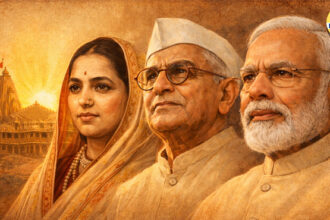Governments and systems don’t always change together. But when a government is strong, the system has no choice but to adapt. And when the system begins to transform, the ripple effects are seen across multiple spheres. One reform impacts another, until change becomes holistic.
This is precisely what India is witnessing today. On one hand, Naxalism in the forests of central India is gasping for its final breath. On the other, bastions of Urban Naxal ideology—long entrenched in certain educational institutions—are now opening up to nationalist thought. The balance is being restored.
From slogans to silence
Not long ago, campuses like Jawaharlal Nehru University (JNU), Hyderabad Central University, and Aligarh Muslim University echoed with slogans such as:
- “Bharat tere tukde honge”
- “Tum kitne Afzal maroge, har ghar se Afzal niklega”
- “Afzal, hum sharminda hain, tere qatil zinda hain”
Afzal here was a terrorist who was convicted for his role in the December 2001 Parliament terror attack. He was hanged on 9 February 2013 after his clemency plea was rejected by the President of India.
Seminars mocking Hindu deities, protests for terrorists’ “human rights,” and separatist rhetoric were routine affairs. In those days, anyone who spoke of nationalism, tradition, or right-wing thought was instantly branded “communal,” “Sanghi,” or “Hindutvawadi.” Students unwilling to face this intellectual hegemony often surrendered to it, reinforcing Left dominance on campus.
This is why when RSS (Rashtriya Swayamsevak Sangh) organized a march-past (Path Sanchalan) at JNU, the news shocked many. JNU had been a Left fortress for decades; nationalism simply wasn’t given space. Yet, here it was—an RSS parade in the heart of a campus once known only for Leftist and separatist activism.
The missing protests
Even more surprising was the response—or lack thereof. For years, leftist student activists made protests a full-time occupation:
- Protesting against Prime Minister Manmohan Singh in 2006,
- Blocking Education Minister Ramesh Pokhriyal in 2019,
- Agitating on one “cause” or another almost daily.
But when the RSS march took place in JNU, there were no angry slogans, no violent demonstrations. Silence.
Why?
The answer lies not only in ABVP’s growing campus presence (winning 23 of 44 councillor seats and the Joint Secretary post in JNU). The deeper reason comes from far away—from the jungles of Chhattisgarh.
The jungle connection
For decades, urban Left activism in universities was not sustained by student enthusiasm alone. Its real muscle came from the Naxal movement in India’s forests.
- The urban naxal networks received funding and strategic backing from their armed comrades.
- University students were the first recruits—often unaware of the larger game—while seasoned activists directed the movement.
- The intimidation power of Left student groups came from the knowledge that they had militant support behind them.
But today, under Home Minister Amit Shah, the Naxal insurgency is collapsing. With the forests no longer providing ideological and financial oxygen, the campus Left finds itself weakened and fearful. Hence, the silence.
Congress steps in
Whenever the Left has weakened, the Congress party has stepped in to revive it. That pattern continues today.
For instance, when JNU saw no protest against RSS, Congress’s student wing NSUI staged violence against an RSS event in Rajasthan University. Chief Minister Ashok Gehlot even questioned the very idea of “shastra poojan” (weapon worship), ridiculing it as unnecessary. But the irony is hard to miss—if not shastra poojan in Rajasthan, then what? “Italy poojan”?
Yet, these attempts cannot undo the fact that the shift within Indian campuses is now irreversible.
A generation ready for change
Why is this change happening? Perhaps because the youth are tired of a one-sided ideological monopoly. Or because nationalism and cultural consciousness in Indian politics has become too strong to ignore, forcing even universities to open their gates.
Whatever the reason, the transformation is significant. Education, after all, is meant to be about debate, exchange of ideas, and learning from criticism—not intellectual monopoly.
A turning point
When a university like JNU hosts an RSS prayer meeting or a march, it is not just a political incident. It is symbolic of something much deeper: the rebalancing of India’s education system.
For decades, Left-liberal dominance ensured that nationalism was mocked and delegitimized. But today, both Left and Right voices are being heard. This equilibrium is not just healthy—it is essential.
Because only in a balanced ecosystem of ideas can India’s future generation truly learn, think, and innovate.









